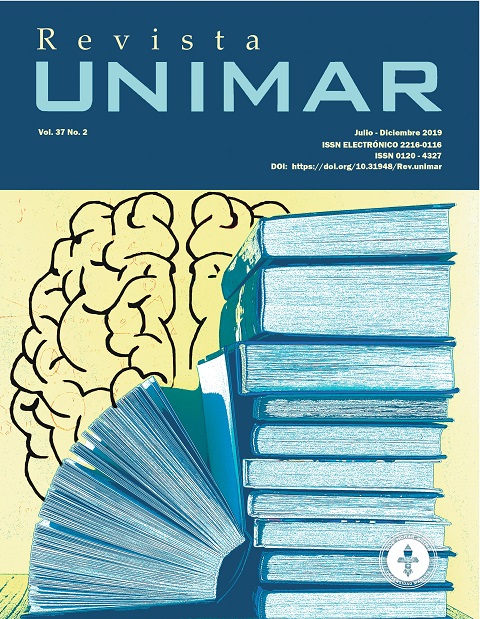Contribution of playful pedagogical strategies focused on the game from meaningful learning
DOI:
https://doi.org/10.31948/Rev.unimar/37-2-art2Keywords:
pedagogy, game, education, educational strategies, educational policiesAbstract
The action research was carried out under a hermeneutical approach, from a reflection and interpretation, through pedagogical strategies focused on play in the classroom of the Health Promotion Technology program of the University of Nariño, under the qualitative paradigm, in a spiral of steps that consist of planning, implementation and evaluation. The strategies of the game instructed the students towards new possibilities of approach to the community, to generate a significant learning, with true capture of theoretical knowledge, made possible in recreation, fun, reflection, and suspension of the reality of the environment, planned from the context, with the seriousness that the game implies from a fruitive, renovating, clear, coherent experience, in five moments: reflection, conceptualization, debate, commitment, evaluation. The game modified the sense of interpreting the contents, leaving the motivation to replicate in the community, to obtain acceptance and approval and transcend knowledge, beyond its internalization.
Author Biography
Luz Elina Caicedo Quiroz, Universidad Nariño
Magíster en Pedagogía; Especialista en Gerencia y Auditoría de la Calidad en Salud; Odontóloga; Licenciada en Educación Básica, Universidad Mariana. Docente hora cátedra, Universidad Nariño; Coordinadora Odontología Proinsalud S. A., Pasto, Nariño, Colombia.
References
Acaso, M. (2013). rEDUvolución. Hacer la revolución en la educación (Contextos). Barcelona, España: Ediciones Paidós.
Arráez, M., Calles, J. y Moreno, L. (2006). La Hermenéutica: una actividad interpretativa. Sapiens, Revista Universitaria de Investigación, 7(2), 171-181.
Ausubel, D. (1983). Teoría del aprendizaje significativo. Recuperado de https://www.academia.edu/10435788/TEOR%C3%8DA_TEORIA_DEL_APRENDIZAJE_SIGNIFICATIVO
Cook, T. y Reichardt, C. (1986). Métodos cualitativos y cuantitativos en investigación evaluativa. Madrid, España: Ediciones Morata, S. L.
Díaz, F. (1999). Estrategias Docentes para un Aprendizaje significativo. Una interpretación significativa. México: McGraw-Hill.
Gadamer, H. G. (1993). Verdad y método. Salamanca, España: Ediciones Sígueme.
Huizinga, J. (2007). Homo ludens (Trad. Imaz, E.). Madrid, España: Alianza Editorial S. A.
Lewin, K. (s.f.). Action Research and Minority problems. Recuperado de https://doi.org/10.1111/j.1540-4560.1946.tb02295.x
Marino, G. (1992). Sistema de formación permanente. Manual Aprender a enseñar. Santafé de Bogotá: Instituto Colombiano de Bienestar Familiar y Grupo Interáreas Fami.
Nussbaum, M. (2010). Sin fines de lucro: Por qué la democracia necesita de las humanidades. Buenos Aires, Argentina: Katz Editores. https://doi.org/10.2307/j.ctvndv60c
Piaget, J. (2005). Inteligencia y afectividad. Buenos Aires, Argentina: Aique Grupo Editor S. A.
Pozo, I. (1996). Aprendices y Maestros. La nueva cultura del aprendizaje. Madrid, España: Alianza Editorial.
Ricoeur, P. (2001). Del texto a la acción. Ensayos de Hermenéutica II (Trad. Corona, P.). Argentina: Fondo de Cultura Económica.
Shklovski, V. (2012). El arte como artificio (Trad. Nethol A. M.). En T. Todorov (Comp.), Teoría de la literatura de los formalistas rusos (pp. 77-98). Madrid, España: Biblioteca Nueva S. L.
Tapia, J. A. (1997). Motivar para el aprendizaje. Teorías y estrategias. España: EDEBÉ.
How to Cite
Downloads
Downloads
Published
Issue
Section
License

This work is licensed under a Creative Commons Attribution 4.0 International License.
Los autores que publiquen en esta revista aceptan las siguientes condiciones:
1. Los autores conservan los derechos de autor y ceden a la revista el derecho de la primera publicación, con el trabajo registrado con la licencia de atribución de Creative Commons, que permite a terceros utilizar lo publicado siempre que mencionen la autoría del trabajo y a la primera publicación en esta revista.
2. Los autores pueden realizar otros acuerdos contractuales independientes y adicionales para la distribución no exclusiva de la versión del artículo publicado en esta revista (p. ej., incluirlo en un repositorio institucional o publicarlo en un libro) siempre que indiquen claramente que el trabajo se publicó por primera vez en esta revista.
3. Se permite y recomienda a los autores publicar su trabajo en Internet (por ejemplo en páginas institucionales o personales) antes y durante el proceso de revisión y publicación, ya que puede conducir a intercambios productivos y a una mayor y más rápida difusión del trabajo publicado (veaThe Effect of Open Access).
| Article metrics | |
|---|---|
| Abstract views | |
| Galley vies | |
| PDF Views | |
| HTML views | |
| Other views | |








